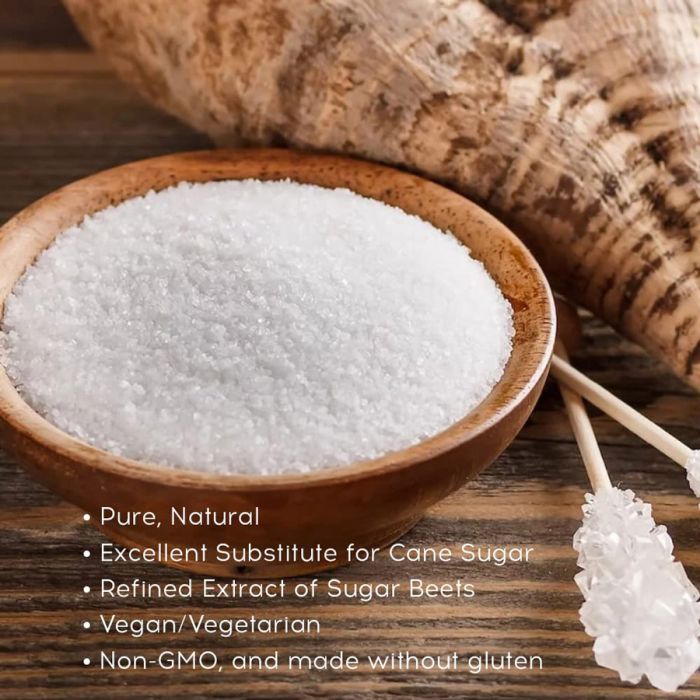The difference between beet sugar vs cane sugar extends beyond taste to how they are harvested.
A Comprehensive Check Out the Benefits and Uses of Beet Sugar Vs Cane Sugar for Sweetening Options
In the world of sweetening, both beet sugar and cane sugar offer unique advantages and culinary roles, albeit with comparable dietary profiles. While beet sugar boasts a neutral taste perfect for various recipes, cane sugar improves recipes with subtle sugar touches. However, the environmental factors to consider of their manufacturing are starkly different, painting a complicated image of sustainability. This juxtaposition welcomes a much deeper expedition right into just how each sugar impacts not only our palates however likewise the earth.
Origins and Handling Techniques of Beet Sugar and Cane Sugar
Beet sugar and cane sugar, 2 predominant sweeteners, stem from very distinctive plants and undertake different handling techniques. Beet sugar is extracted from the sugar beet, a root vegetable, mostly grown in cooler climates. The handling involves slicing the beetroots to extract the juice, which is after that cleansed and crystallized into sugar. This approach is fairly reliable, enabling for sugar healing from multiple stages of the procedure.
On the other hand, cane sugar comes from the sugarcane plant, a tropical grass. Its processing starts with harvesting the cane, squashing it to get the juice, and then boiling this fluid to form sugar crystals.
Nutritional Comparison: Beet Sugar Versus Cane Sugar

When comparing the nutritional content of beet sugar and cane sugar, it comes to be evident that both types offer a similar power worth. Each provides about 4 calories per gram, mostly as sucrose, which is a straightforward carb. This similarity includes their lack of vital nutrients; neither kind of sugar has considerable quantities of vitamins or minerals. Both beet and cane sugar are 99.9% pure sucrose, making them basically identical in terms of calorie material and dietary account.
Nevertheless, small differences might arise from the marginal trace aspects that remain after processing, though these are as well small to effect general health and wellness. For example, cane sugar can preserve traces of molasses, depending on the level of refining, which may include minuscule quantities of calcium, iron, and potassium. Beet sugar, on the various other hand, commonly undertakes a process that gets rid of these micronutrient better, causing an even purer type of sucrose.
Culinary Makes Use Of and Taste Profiles
Regardless of their dietary resemblances, beet sugar and cane sugar deviate significantly in their culinary applications and taste subtleties. Beet sugar, obtained from sugar beetroots, typically has an extremely neutral taste, making it a preferred selection in cooking where it perfectly integrates without modifying the flavor profile of other components.
Chefs and home cooks alike pick sugars based upon these features. While both sugars function in a similar way in terms of sweet taste and physical homes, the mild taste difference can influence the result of a meal significantly, guiding the option in between beet and cane sugar based on the preferred outcome in cooking developments.
Health Implications of Consuming Beet and Cane Sugars
Although beet sugar and cane sugar are typically used mutually in food preparation and cooking, their health and wellness Web Site implications can differ subtly due to their unique processing approaches. Both sugars supply concerning the exact same quantity of calories and carbohydrates per teaspoon, essentially visit homepage using comparable power contributions without any inherent nutritional benefits. The refining process for each sugar can modify the existence of trace minerals and compounds, although these variants are normally very little and not considerable enough to influence one's wellness meaningfully.
The key health worry about both types of sugar concern their contribution to excessive calorie consumption, potentially causing weight gain, and involved illness like kind 2 diabetes and heart condition when eaten in huge quantities. Therefore, despite the resource, moderation is type in eating beet or cane sugars. Health professionals often advise restricting added sugars in any type of kind to preserve optimal health end results.
Ecological Impact and Sustainability of Sugar Production

Conversely, sugar beet handling tends to produce huge amounts of pulp waste, which can be repurposed as animal feed or transformed into bioenergy, thus minimizing some environmental effects (beet sugar vs cane sugar). Inevitably, the sustainability of sugar production depends upon taking on more eco-friendly farming techniques and waste administration techniques to decrease the environmental impact of both sugar kinds

Conclusion
Beet sugar is significant for its sustainability and neutral preference, whereas cane sugar is prized for its rich taste. Consumers must take into consideration these elements, along with the ecological effects of sugar production, to make informed options concerning sugar intake that align with culinary requirements and moral worths.